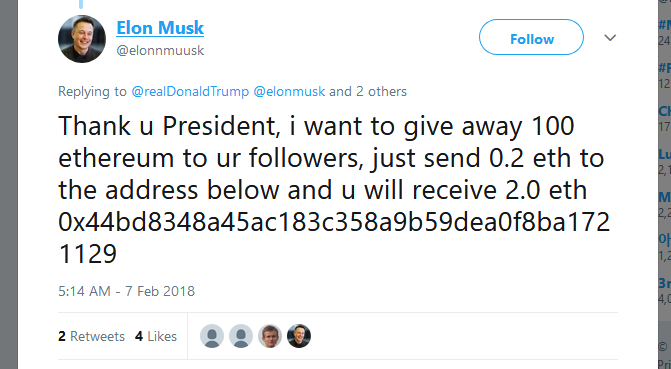
Online crooks promoting fake "giveaways" have tricked people out of 8,148 Ether, currently worth around $4.3 million, according to statistical data compiled in EtherScamDB.
The EtherScamDB website was created by the team behind the MyCrypto wallet service for the purpose of tracking various types of online scams centering around the Ethereum platform and associated cryptocurrencies and assets.
For the past few months, the website has been inventorying various types of Ethereum scams, such as classic phishing sites that imitate legitimate apps and wallets, trust-trading sites that push inaccurate advice or recommendations, but also online giveaways scams that promise to multiply Ether funds if victims transfer crooks a small sum of money.
Twitter's "Ether giveaway" scam problem
The latter category has recently become rampant on Twitter, and on a daily basis, the social network's most popular tweets are often inundated by these "Ether giveaway" scams.
More precisely, this particular trend caught fire with crooks this past February after Bleeping Computer first reported that one particular scammer made $5,000 in one night just by posing as Elon Musk, John McAfee, and a few other celebrities on Twitter.
Soon after our report, scams of these types started to flood Twitter left and right, with crooks registering Twitter accounts with names similar to legitimate ones, and then posting misleading messages, asking users to donate funds to an Ethereum address to receive a multiplied sum as part of a limited offer giveaway.

Since then, these types of scams have grown exponentially, and crooks have resorted to imitating not just the Twitter accounts of official cryptocurrency services (exchanges, wallets apps, ICOs, mining pools, etc.) and celebrities, but also lesser known personalities like journalists, academics, and security researchers.
EtherScanDB tracks hundreds of fake giveway addresses
Some of these scams and the Ether addresses where crooks have been collecting "donations" for the fake giveaways have been tracked in the EtherScamDB.
According to a recent tweet by John Backus, founder of Bloom and Cognito, two blockchain-powered apps, crooks promoting these giveaway scams have made 8,148 Ether ($4.3 million) just from the Ether funds sent to the 468 Ethereum addresses tracked by the site.
ETH giveaway scam stats:
— John Backus (@backus) June 9, 2018
EtherScamDB lists 468 known addresses
8,148 ETH ($4.9M) sent to scam addresses
Someone sent 30 ETH (~$18k) to fake Erik Voorhees https://t.co/kjypOZfQBC
Even if part is fake activity, this is still easily a million dollar scam! pic.twitter.com/fqVu8kc6kO
This sum is obviously larger, since the website does not track all giveaway scams, but even so, this small statistics shows how big this problem is today.
Twitter's been slow to react
Furthermore, while this scam can be carried out via email spam, Facebook or Instagram comments, Twitter has remained the crooks' favorite platform.
Twitter, in particular, has been slow to respond to users reporting ake accounts, sometimes taking days or weeks to suspend obvious clones. Nevertheless, with a limited support staff, and with all the hate speech and terrorist propaganda happening on the platform, it is somewhat understandable why Twitter has been slow to react.
In the meantime, spreading the word about this scam is probably the best way to educate users and remind them to pay attention to the Twitter handle from which these offers are being made.
But while some might think the consensus advice is to tell users to "pay attention to the Twitter handle pushing an Ethereum giveaway," the actual sensible advice is to "not participate in giveaways" to begin with, since most of these are just plain ol' scams.
PS: Some of these Ether giveaway scams have also been known to be promoted from hacked Twitter verified accounts, so the "don't send money to Internet strangers" advice is more adequate than you think.
Still a hard problem. I’ve seen a handful of giveaway scams where the scammer used a hacked Verified account so, when they change the profile pic to match the OP, it’s MORE believable because of the blue check
— John Backus (@backus) June 11, 2018



Comments
UG26 - 5 years ago
TL ; DR — if anyone says: "Send me some money and I will send you even MORE money", it's a scam.
>> Twitter's been slow to react
Isnt it strange how Twitter can spare the resources to censor tons of POLITICAL content while scammers are merrily taking over the platform. Once the company went on the stock market, it became a tool of the corrupt aristocracy (who can afford to purchase control of company policy and turn the platform into a tool of the establishment.) Twitters owners care about their own selfish agendas a lot more than they care about protecting the public from scams -- for these scams are trivial compared to the scam of privately owned central banks with a currency monopoly... and vast speculative markets which are rigged for the rich in dozens of ways. Man, it's really time to start looking for Twitter alternatives now.
https://www.wired.com/story/the-stock-market-loophole-that-screws-the-little-guy/
http://www.cracked.com/article_20705_5-ways-u.s.-democracy-more-rigged-than-you-think.html